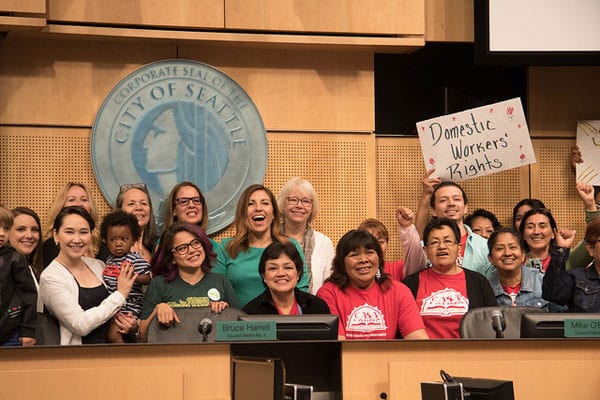
February 24, 2019; New York Times Magazine
Despite the shrinking power of unions and traditional collective bargaining, the past decade has demonstrated that creative organizing can make a difference in the lives of American workers. Two campaigns—the Fight for $15 and the National Domestic Workers Alliance—have had considerable success in changing attitudes as well as the material conditions of growing numbers of low-wage workers.
Arguably, the Fight for $15, which has had the backing of the Service Employees International Union, has been the most successful. The campaign, which began with a fast-food workers’ strike in 2012, has reset the bar for any discussion of a reasonable wage floor. And it has resulted in real gains for millions of workers. By 2015, 14 cities and states had approved a $15 minimum wage, though for most, the increases are staged over multiple years. Today, four states—New York, New Jersey, Massachusetts, and California—are on the path to a $15 minimum wage. The 2019 federal Raise the Wage Act would increase the minimum wage to $15 by 2024, affecting nearly 40 million workers, according to the Economic Policy Institute.
Ai-Jen Poo began organizing domestic workers in New York City in the late 1990s. In 2007, she joined forces with several other groups doing similar work in other cities, forming the National Domestic Workers Alliance. The organization has four local chapters, and 63 affiliate organizations.
NDWA is trying to build a floor of basic legal protections for the 2.5 million mostly women of color, largely immigrant workers who care for children and older adults in private homes. Over the last decade, eight states have passed legislation known as the Domestic Workers Bill of Rights, and in late November, Senator Kamala Harris and Representative Pramila Jayapal announced their intention to introduce similar federal legislation this year.
An estimated 70 percent of domestic workers earn wages below $13 an hour, according to the NDWA website. But more importantly, their employment is highly unregulated: no employment contract, no overtime pay or paid vacation days, no protection from abuse. Although domestic workers are technically covered under the Fair Labor Standards Act, many are paid under the table, know little about their rights, and feel too vulnerable to speak up when being exploited. NDWA has provided an important avenue for raising their collective voices and challenging the status quo.
The federal Domestic Workers Bill of Rights, though highly unlikely to become law, is significant as a platform for education and organizing. It lays out the elements of a “good job,” not just for domestic workers, but for all those trying to earn a living in the “gig economy.” The law, according to Bryce Covert in The Nation, would guarantee basic federal labor protections such as the right to overtime pay when workers put in more than 40 hours a week, inclusion under the Occupational Safety and Health Administration, the right to form unions, and recourse for harassment or discrimination. It would also extend the right to meal and rest breaks, paid sick days, advance notice of scheduling changes, and the right to privacy as a live-in worker. The bill also includes the right to a written work contract, so workers know what their responsibilities are.
Sign up for our free newsletters
Subscribe to NPQ's newsletters to have our top stories delivered directly to your inbox.
By signing up, you agree to our privacy policy and terms of use, and to receive messages from NPQ and our partners.
The bill has an additional wish list from ideas circulating in conversations about how to address the needs of workers who no longer have access to employer-based benefit systems. These include a retirement savings plan funded by employers, affordable health insurance, and access to training and development programs.
Arguments for improving the quality of jobs—through higher wages, better working conditions, and opportunities for advancement—are numerous. Evidence abounds demonstrating that workers are more productive when they are respected and valued. Counter arguments that claim raising the minimum wage hurts job growth have been thoroughly debunked. Still, the federal minimum wage remains stagnant, and as Matt Desmond points out in the New York Times, at least 2 million workers earn at or below the federal minimum wage of $7.25 per hour.
Desmond brings a new argument to the table: public health. He reviews a new crop of studies that demonstrate that low wages undermine the health of workers and their families. As Dr. Margot Kushel, who directs the University of California, San Francisco Center for Vulnerable Populations, tells him:
We will spend an incredible amount on a new heart drug. But if we increased wages by $1, we’d save more lives.
Kushel explains that when San Francisco and surrounding cities raised the minimum wage to $15, her patients changed their behaviors. She noticed they “exercise more. They are less stressed and can quit smoking. Their mental health improves pretty dramatically. Their sleep gets better. And people start eating healthier almost immediately.”
Poverty causes chronic stress, which impacts people at the cellular level. As Desmond notes, “It has been linked to a wide array of adverse conditions, from maternal health problems to tumor growth.” Public health researcher Tsu-Yu Tsao tells Desmond that he was “unaware of any drug on the market that comes close to having this big of an effect.”
In dysfunctional Washington, it is clear that both the Raise the Wage Act and the federal Domestic Workers Bill of Rights are platforms for the Democratic Party without any path to becoming law. But they do go a long way in defining the meaning of a “good job” in 21st century America. When combined with Elizabeth Warren’s call for universal childcare, perhaps there is hope for a future in which families have the supports they need to not just survive but thrive. Affordable child care could have additional impacts as well—formalizing much of the care currently provided by domestic workers and providing perhaps a more fruitful path to quality jobs.—Karen Kahn












